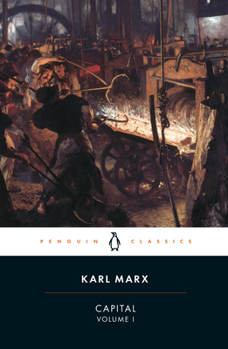Capital: A Critique of Political Economy, Volume 1
(Part of the Capital Series)
Select Format
Select Condition 
Book Overview
The first volume of a political treatise that changed the world One of the most notorious works of modern times, as well as one of the most influential, Capital is an incisive critique of private property and the social relations it generates. Living in exile in England, where this work was largely written, Marx drew on a wide-ranging knowledge of its society to support his analysis and create fresh insights. Arguing that capitalism would cause an ever-increasing division in wealth and welfare, he predicted its abolition and replacement by a system with common ownership of the means of production. Capital rapidly acquired readership among the leaders of social democratic parties, particularly in Russia in Germany, and ultimately throughout the world, to become a work described by Marx friend and collaborator Friedrich Engels as "the Bible of the working class." For more than seventy years, Penguin has been the leading publisher of classic literature in the English-speaking world. With more than 1,700 titles, Penguin Classics represents a global bookshelf of the best works throughout history and across genres and disciplines. Readers trust the series to provide authoritative texts enhanced by introductions and notes by distinguished scholars and contemporary authors, as well as up-to-date translations by award-winning translators.
Format:Paperback
Language:English
ISBN:B01EKIFWVE
ISBN13:9780140445688
Release Date:May 1992
Publisher:Penguin Classics
Length:1152 Pages
Weight:1.61 lbs.
Dimensions:2.1" x 5.0" x 8.1"
Age Range:18 years and up
Grade Range:Postsecondary and higher
Customer Reviews
5 ratings
Marx
Published by Thriftbooks.com User , 15 years ago
As a history teacher, it is always nice to get back into the text and re-discover what history is all about. Economic theory is somehting that has eluded me for a long time. This book is outstanding.
Seeing in the Fifth Dimension
Published by Thriftbooks.com User , 20 years ago
I think it was the poor French philosopher Althusser who claimed that Marx had discovered a new continent of thought called "history" equivalent to the continents of thought discovered by Pythagoras (geometry) and Aristotle (science). I would use a different metaphor. It is as if Marx invented a pair of x-ray glasses that allows you the viewer to see the exploitation hidden in every commodity, no matter how beautifully it is packaged. I guess the only book it is really comparable to would be the Bible, edited and created in the year 207 by the North African Roman citizen Quintus Septimius Florens Tertullianus. On the narrative level the books are quite opposite. The one starts with a single savior who comes to save the world, but ends up being exploited, abused and killed, thus needing saving, the other starts with a class that is exploited, abused and killed, but ends up saving the world. Of the two, Marx is definitely the more optimistic view. But if we could resurrect Marx as we resurrected Jesus, would he still have his optimism?
still many good points
Published by Thriftbooks.com User , 24 years ago
As a student in Economics, I always engage in comparative analysis of Economics. Marxian Economics is generally presented as an early critique of classial economy, and a "difficult" one too. As to difficulty, it is not that unconscionably incomprehensible! There are many apsects of Marxian Economics that make a lot of sense (to me). True, Marx is most likely to be appealing to workers and below subsistence income earners, just as much as classical and neoclasscial economics is most likely to appeal to capital owners and free "marketeers". Not to forget Keynes who will garner support from those who prefer reasonable state intervention! So every school of thought has its own target and appeal. In this book, you will find basic concepts of labour theory of value (what determines the value of a commodity); monetary theory (the evolution of money); the Theory of Surplus Value (what is profit and how does it come about - to Marx, profit represents that portion of icome/value "improperly" appropriated by capital owners instead of accruing to workers. Since workers are the sole producers of goods from scratch to end, they should benefit from all income, or at least from most of it, as per Marxian argument); and lastly, the mechanism of production. Trust me, if you read Marxism with an open mind (and not with a bias attitude of it being revolutionary, inefficient, dictatorial and a threat), you will realize it has a very interesting, unique and relatively realistic method of explaning inequality and exploitation generally! Relative poverty does not exist exclusively in poor or so called "third-world" countries, even in UK, for example, there are relatively poor people (who for example cannot afford private schooling), despite its strong economy. As much as Communism/Socilaism is history, the ideas are still alive and very much interesting! Read it to enhance your understanding of this renowned work by Karl Marx!
The highest point of classical political economy
Published by Thriftbooks.com User , 24 years ago
Marx's Kapital brings to climax the research programme of classical political economy by its throughgoing analysis of the contradictions inherent in capitalism. Marx's magnum opus shows capitalism to be a historically transitory system which arose from feudalism and which was to necessarily to give way to socialism. Marx set "understanding the laws of motion of capitalism" to be his task and he succeeded much better than many modern theorists.
very interesting book
Published by Thriftbooks.com User , 24 years ago
As a loyal citizen of the United Kingdom, i must say, though this book has got to be one fo the most boring books i have ever read, it did bring some hope for me for the future. I remeber Orwell's words, "If you want a vision of the future, imagine a boot stamping on a human face -- forever." I think that Das Kapital gave me more optomism and idealism for the future of our pitiful civilisation.






